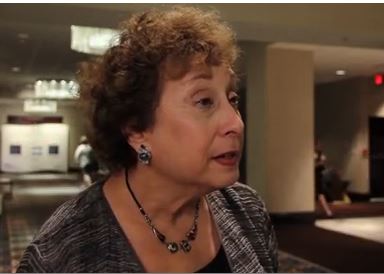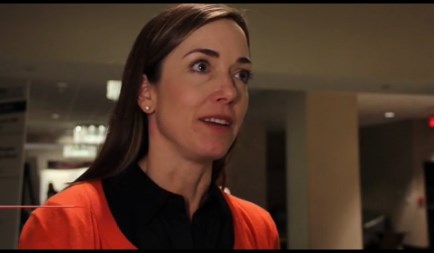User login
Miami Breast Cancer Conference
VIDEO: Sexuality, fertility are focus of cancer education website
MIAMI BEACH – Often people living with cancer hesitate to ask their providers about sensitive and important issues surrounding sexuality and fertility. At the same time, some clinicians remain uncomfortable raising questions regarding sexual function or simply lack the time to appropriately address the issues during a patient encounter.
A new online resource aims to solve both problems simultaneously, giving both patients and providers the tools to meaningfully address sexuality and fertility issues, Leslie R. Schover, PhD, said in a video interview at the annual Miami Breast Cancer Conference, held by Physicians’ Education Resource.
The Will2love.com site features first-person patient account videos from women and men who faced similar concerns, said Dr. Schover, founder of the Will2Love digital health company based in Houston. In addition, vignettes with actors inform patients and also model how oncologists, oncology nurses, and other staff could effectively communicate with concerned patients. A professional portal offers online skills training for clinicians.
The video associated with this article is no longer available on this site. Please view all of our videos on the MDedge YouTube channel
MIAMI BEACH – Often people living with cancer hesitate to ask their providers about sensitive and important issues surrounding sexuality and fertility. At the same time, some clinicians remain uncomfortable raising questions regarding sexual function or simply lack the time to appropriately address the issues during a patient encounter.
A new online resource aims to solve both problems simultaneously, giving both patients and providers the tools to meaningfully address sexuality and fertility issues, Leslie R. Schover, PhD, said in a video interview at the annual Miami Breast Cancer Conference, held by Physicians’ Education Resource.
The Will2love.com site features first-person patient account videos from women and men who faced similar concerns, said Dr. Schover, founder of the Will2Love digital health company based in Houston. In addition, vignettes with actors inform patients and also model how oncologists, oncology nurses, and other staff could effectively communicate with concerned patients. A professional portal offers online skills training for clinicians.
The video associated with this article is no longer available on this site. Please view all of our videos on the MDedge YouTube channel
MIAMI BEACH – Often people living with cancer hesitate to ask their providers about sensitive and important issues surrounding sexuality and fertility. At the same time, some clinicians remain uncomfortable raising questions regarding sexual function or simply lack the time to appropriately address the issues during a patient encounter.
A new online resource aims to solve both problems simultaneously, giving both patients and providers the tools to meaningfully address sexuality and fertility issues, Leslie R. Schover, PhD, said in a video interview at the annual Miami Breast Cancer Conference, held by Physicians’ Education Resource.
The Will2love.com site features first-person patient account videos from women and men who faced similar concerns, said Dr. Schover, founder of the Will2Love digital health company based in Houston. In addition, vignettes with actors inform patients and also model how oncologists, oncology nurses, and other staff could effectively communicate with concerned patients. A professional portal offers online skills training for clinicians.
The video associated with this article is no longer available on this site. Please view all of our videos on the MDedge YouTube channel
VIDEO: Residual cancer burden may be better outcome measure than pCR
MIAMI BEACH – The Food and Drug Administration has accepted pathological complete response rate (pCR) as a surrogate endpoint for disease-free and overall survival in clinical trials for neoadjuvant therapy of breast cancer.
Yet the specimen collection and histopathologic methods used to measure pCR have differed considerably across major neoadjuvant trials for breast cancer, said Michael F. Press, MD, PhD, of the USC/Norris Comprehensive Cancer Center at the University of California, Los Angeles.
In a video interview conducted at the annual Miami Breast Cancer Conference, held by Physicians’ Education Resource, Dr. Press outlined the problems associated with a lack of standardization of outcomes measures, and described how residual cancer burden may be a more effective, validated measures for comparing outcomes across clinical trials.
The video associated with this article is no longer available on this site. Please view all of our videos on the MDedge YouTube channel
Dr. Press disclosed grant/research support from Cepheid, and consulting with Cepheid, Karyopharm Therapeutics, Eli Lilly, Puma Biotechnology, Halozyme Therapeutics, Biocartis SA, and ADC Therapeutics.
MIAMI BEACH – The Food and Drug Administration has accepted pathological complete response rate (pCR) as a surrogate endpoint for disease-free and overall survival in clinical trials for neoadjuvant therapy of breast cancer.
Yet the specimen collection and histopathologic methods used to measure pCR have differed considerably across major neoadjuvant trials for breast cancer, said Michael F. Press, MD, PhD, of the USC/Norris Comprehensive Cancer Center at the University of California, Los Angeles.
In a video interview conducted at the annual Miami Breast Cancer Conference, held by Physicians’ Education Resource, Dr. Press outlined the problems associated with a lack of standardization of outcomes measures, and described how residual cancer burden may be a more effective, validated measures for comparing outcomes across clinical trials.
The video associated with this article is no longer available on this site. Please view all of our videos on the MDedge YouTube channel
Dr. Press disclosed grant/research support from Cepheid, and consulting with Cepheid, Karyopharm Therapeutics, Eli Lilly, Puma Biotechnology, Halozyme Therapeutics, Biocartis SA, and ADC Therapeutics.
MIAMI BEACH – The Food and Drug Administration has accepted pathological complete response rate (pCR) as a surrogate endpoint for disease-free and overall survival in clinical trials for neoadjuvant therapy of breast cancer.
Yet the specimen collection and histopathologic methods used to measure pCR have differed considerably across major neoadjuvant trials for breast cancer, said Michael F. Press, MD, PhD, of the USC/Norris Comprehensive Cancer Center at the University of California, Los Angeles.
In a video interview conducted at the annual Miami Breast Cancer Conference, held by Physicians’ Education Resource, Dr. Press outlined the problems associated with a lack of standardization of outcomes measures, and described how residual cancer burden may be a more effective, validated measures for comparing outcomes across clinical trials.
The video associated with this article is no longer available on this site. Please view all of our videos on the MDedge YouTube channel
Dr. Press disclosed grant/research support from Cepheid, and consulting with Cepheid, Karyopharm Therapeutics, Eli Lilly, Puma Biotechnology, Halozyme Therapeutics, Biocartis SA, and ADC Therapeutics.
AT MBCC
VIDEO: Genomics, other advances further highlight how breast cancer differs in men
MIAMI BEACH – Growing evidence continues to point to a widening separation between female and male breast cancers, particularly with discoveries suggesting different pathways to disease and important genetic distinctions.
Therefore, the traditional practice of extrapolating findings from female breast cancer research to men with breast cancer no longer makes sense, Patrick I. Borgen, MD, said at the annual Miami Breast Cancer Conference, held by Physicians’ Education Resource.
The incidence of male breast cancer is increasing. At the same time, fewer men with breast cancer get referred for and undergo genetic testing for their disease, said Dr. Borgen, chair of the department of surgery at Maimonides Medical Center in Brooklyn, N.Y.
Dr. Borgen explained in a video interview that both maternal and paternal inheritance of breast cancer are important, and they tie the lineage into a hypothesis for why BRCA mutations – which can predispose people to worse survival – have persisted through generations.
The video associated with this article is no longer available on this site. Please view all of our videos on the MDedge YouTube channel
Dr. Borgen is a member of the speakers bureau for Genomic Health Inc., NanoString Technologies, Genentech, and Pacira Inc.
MIAMI BEACH – Growing evidence continues to point to a widening separation between female and male breast cancers, particularly with discoveries suggesting different pathways to disease and important genetic distinctions.
Therefore, the traditional practice of extrapolating findings from female breast cancer research to men with breast cancer no longer makes sense, Patrick I. Borgen, MD, said at the annual Miami Breast Cancer Conference, held by Physicians’ Education Resource.
The incidence of male breast cancer is increasing. At the same time, fewer men with breast cancer get referred for and undergo genetic testing for their disease, said Dr. Borgen, chair of the department of surgery at Maimonides Medical Center in Brooklyn, N.Y.
Dr. Borgen explained in a video interview that both maternal and paternal inheritance of breast cancer are important, and they tie the lineage into a hypothesis for why BRCA mutations – which can predispose people to worse survival – have persisted through generations.
The video associated with this article is no longer available on this site. Please view all of our videos on the MDedge YouTube channel
Dr. Borgen is a member of the speakers bureau for Genomic Health Inc., NanoString Technologies, Genentech, and Pacira Inc.
MIAMI BEACH – Growing evidence continues to point to a widening separation between female and male breast cancers, particularly with discoveries suggesting different pathways to disease and important genetic distinctions.
Therefore, the traditional practice of extrapolating findings from female breast cancer research to men with breast cancer no longer makes sense, Patrick I. Borgen, MD, said at the annual Miami Breast Cancer Conference, held by Physicians’ Education Resource.
The incidence of male breast cancer is increasing. At the same time, fewer men with breast cancer get referred for and undergo genetic testing for their disease, said Dr. Borgen, chair of the department of surgery at Maimonides Medical Center in Brooklyn, N.Y.
Dr. Borgen explained in a video interview that both maternal and paternal inheritance of breast cancer are important, and they tie the lineage into a hypothesis for why BRCA mutations – which can predispose people to worse survival – have persisted through generations.
The video associated with this article is no longer available on this site. Please view all of our videos on the MDedge YouTube channel
Dr. Borgen is a member of the speakers bureau for Genomic Health Inc., NanoString Technologies, Genentech, and Pacira Inc.
AT MBCC
VIDEO: It’s too early to give up on immunotherapy for breast cancer
MIAMI BEACH – The remarkable progress seen with immune checkpoint inhibitors in metastatic melanoma, non–small-cell lung cancer, and other tumors has yet to be replicated in breast cancer, but it’s early days yet, and breast cancer researchers need more time before the ultimate clinical benefits of immunotherapy in breast cancer can be ascertained, said Adam M. Brufsky, MD, PhD, of the University of Pittsburgh.
Early studies with inhibitors of programmed death-1 (PD-1) and its ligand PD-L1 in patients with advanced triple-negative breast cancer have yielded only minimal response rates to date, but it it’s far too early to give up on the concept, Dr. Brufsky cautioned at the annual Miami Breast Cancer Conference, held by Physicians’ Education Resource.
In a video interview, he discussed the challenges of treating breast cancers, which may be less immunogenic and have a lower tumor mutational burden than other malignancies that respond more readily to PD-1 inhibition. Several large, phase III clinical trials of checkpoint inhibitors combined with cytotoxic chemotherapy are underway, he said, and those eventual findings may shed light on the optimal approach to using immunotherapy to treat patients with refractory metastatic breast cancers.
The video associated with this article is no longer available on this site. Please view all of our videos on the MDedge YouTube channel
Dr. Brufsky disclosed consulting with Novartis, Eisai, Celgene, Lilly, Pfizer, Agendia, Genomic Health, NanoString Technologies and Biotheranostics.
MIAMI BEACH – The remarkable progress seen with immune checkpoint inhibitors in metastatic melanoma, non–small-cell lung cancer, and other tumors has yet to be replicated in breast cancer, but it’s early days yet, and breast cancer researchers need more time before the ultimate clinical benefits of immunotherapy in breast cancer can be ascertained, said Adam M. Brufsky, MD, PhD, of the University of Pittsburgh.
Early studies with inhibitors of programmed death-1 (PD-1) and its ligand PD-L1 in patients with advanced triple-negative breast cancer have yielded only minimal response rates to date, but it it’s far too early to give up on the concept, Dr. Brufsky cautioned at the annual Miami Breast Cancer Conference, held by Physicians’ Education Resource.
In a video interview, he discussed the challenges of treating breast cancers, which may be less immunogenic and have a lower tumor mutational burden than other malignancies that respond more readily to PD-1 inhibition. Several large, phase III clinical trials of checkpoint inhibitors combined with cytotoxic chemotherapy are underway, he said, and those eventual findings may shed light on the optimal approach to using immunotherapy to treat patients with refractory metastatic breast cancers.
The video associated with this article is no longer available on this site. Please view all of our videos on the MDedge YouTube channel
Dr. Brufsky disclosed consulting with Novartis, Eisai, Celgene, Lilly, Pfizer, Agendia, Genomic Health, NanoString Technologies and Biotheranostics.
MIAMI BEACH – The remarkable progress seen with immune checkpoint inhibitors in metastatic melanoma, non–small-cell lung cancer, and other tumors has yet to be replicated in breast cancer, but it’s early days yet, and breast cancer researchers need more time before the ultimate clinical benefits of immunotherapy in breast cancer can be ascertained, said Adam M. Brufsky, MD, PhD, of the University of Pittsburgh.
Early studies with inhibitors of programmed death-1 (PD-1) and its ligand PD-L1 in patients with advanced triple-negative breast cancer have yielded only minimal response rates to date, but it it’s far too early to give up on the concept, Dr. Brufsky cautioned at the annual Miami Breast Cancer Conference, held by Physicians’ Education Resource.
In a video interview, he discussed the challenges of treating breast cancers, which may be less immunogenic and have a lower tumor mutational burden than other malignancies that respond more readily to PD-1 inhibition. Several large, phase III clinical trials of checkpoint inhibitors combined with cytotoxic chemotherapy are underway, he said, and those eventual findings may shed light on the optimal approach to using immunotherapy to treat patients with refractory metastatic breast cancers.
The video associated with this article is no longer available on this site. Please view all of our videos on the MDedge YouTube channel
Dr. Brufsky disclosed consulting with Novartis, Eisai, Celgene, Lilly, Pfizer, Agendia, Genomic Health, NanoString Technologies and Biotheranostics.
AT MBCC
VIDEO: Multiple PARP inhibitors show promise in breast cancer treatment
MIAMI BEACH – Driven by efficacy demonstrated in ovarian cancer, a number of PARP inhibitors are in development and hold promise for treatment of breast cancer as well, including patients positive for the BRCA mutation.
Interestingly, early evidence suggests these agents could also treat BRCA-negative women, potentially expanding their future clinical utility, Kimberly L. Blackwell, MD, said in a video interview at the annual Miami Breast Cancer Conference, held by Physicians’ Education Resource.
The video associated with this article is no longer available on this site. Please view all of our videos on the MDedge YouTube channel
Although it’s early, PARP inhibitors potentially could also be combined with standard platinum-based chemotherapy agents, although toxicity and the optimal timing of the regimens need further evaluation, said Dr. Blackwell, professor of medicine and assistant professor of radiation oncology at Duke University Medical Center, Durham, N.C.
Approval of the first PARP inhibitor indicated for breast cancer is expected in 2017, she said.
Dr. Blackwell received institutional grant support from AstraZeneca and Pfizer.
MIAMI BEACH – Driven by efficacy demonstrated in ovarian cancer, a number of PARP inhibitors are in development and hold promise for treatment of breast cancer as well, including patients positive for the BRCA mutation.
Interestingly, early evidence suggests these agents could also treat BRCA-negative women, potentially expanding their future clinical utility, Kimberly L. Blackwell, MD, said in a video interview at the annual Miami Breast Cancer Conference, held by Physicians’ Education Resource.
The video associated with this article is no longer available on this site. Please view all of our videos on the MDedge YouTube channel
Although it’s early, PARP inhibitors potentially could also be combined with standard platinum-based chemotherapy agents, although toxicity and the optimal timing of the regimens need further evaluation, said Dr. Blackwell, professor of medicine and assistant professor of radiation oncology at Duke University Medical Center, Durham, N.C.
Approval of the first PARP inhibitor indicated for breast cancer is expected in 2017, she said.
Dr. Blackwell received institutional grant support from AstraZeneca and Pfizer.
MIAMI BEACH – Driven by efficacy demonstrated in ovarian cancer, a number of PARP inhibitors are in development and hold promise for treatment of breast cancer as well, including patients positive for the BRCA mutation.
Interestingly, early evidence suggests these agents could also treat BRCA-negative women, potentially expanding their future clinical utility, Kimberly L. Blackwell, MD, said in a video interview at the annual Miami Breast Cancer Conference, held by Physicians’ Education Resource.
The video associated with this article is no longer available on this site. Please view all of our videos on the MDedge YouTube channel
Although it’s early, PARP inhibitors potentially could also be combined with standard platinum-based chemotherapy agents, although toxicity and the optimal timing of the regimens need further evaluation, said Dr. Blackwell, professor of medicine and assistant professor of radiation oncology at Duke University Medical Center, Durham, N.C.
Approval of the first PARP inhibitor indicated for breast cancer is expected in 2017, she said.
Dr. Blackwell received institutional grant support from AstraZeneca and Pfizer.
AT MBCC
VIDEO: What’s new with HER2-neu inhibition
MIAMI BEACH – Breast tumors positive for the human epidermal growth factor receptor-2 (HER2) comprise only about 20% of all breast cancers, but for patients with HER2-positive disease, neoadjuvant therapy with trastuzumab (Herceptin) was and is a game changer, improving pathological complete response rates and long-term disease-free and overall survival rates, Debu Tripathy, MD, said at the annual Miami Breast Cancer Conference, held by Physicians’ Education Resource.
In the nearly 2 decades that have passed since the approval of trastuzumab, clinicians have learned how best to use HER2 inhibitors, how to weigh the relative risks and benefits of anti-HER2 therapy in patients who may be at risk for cardiotoxicities such as heart failure, and what combination regimens work best with HER2 inhibitors in early-stage disease.
In a video interview, Dr. Tripathy, professor and chair of the department of breast medical oncology at the University of Texas MD Anderson Cancer Center in Houston, discusses current clinical considerations for the use of trastuzumab and pertuzumab (Perjeta) in the neoadjuvant and adjuvant settings, investigational targeted therapies and immunotherapeutic strategies, and recently released clinical trial data showing a significant increase in disease-free survival for patients treated with dual HER2-blockade compared with HER2 monotherapy.
The video associated with this article is no longer available on this site. Please view all of our videos on the MDedge YouTube channel
Dr. Tripathy disclosed research/grant support from Novartis, and consulting for Nektar, Novartis, and Puma Biotechnology.
MIAMI BEACH – Breast tumors positive for the human epidermal growth factor receptor-2 (HER2) comprise only about 20% of all breast cancers, but for patients with HER2-positive disease, neoadjuvant therapy with trastuzumab (Herceptin) was and is a game changer, improving pathological complete response rates and long-term disease-free and overall survival rates, Debu Tripathy, MD, said at the annual Miami Breast Cancer Conference, held by Physicians’ Education Resource.
In the nearly 2 decades that have passed since the approval of trastuzumab, clinicians have learned how best to use HER2 inhibitors, how to weigh the relative risks and benefits of anti-HER2 therapy in patients who may be at risk for cardiotoxicities such as heart failure, and what combination regimens work best with HER2 inhibitors in early-stage disease.
In a video interview, Dr. Tripathy, professor and chair of the department of breast medical oncology at the University of Texas MD Anderson Cancer Center in Houston, discusses current clinical considerations for the use of trastuzumab and pertuzumab (Perjeta) in the neoadjuvant and adjuvant settings, investigational targeted therapies and immunotherapeutic strategies, and recently released clinical trial data showing a significant increase in disease-free survival for patients treated with dual HER2-blockade compared with HER2 monotherapy.
The video associated with this article is no longer available on this site. Please view all of our videos on the MDedge YouTube channel
Dr. Tripathy disclosed research/grant support from Novartis, and consulting for Nektar, Novartis, and Puma Biotechnology.
MIAMI BEACH – Breast tumors positive for the human epidermal growth factor receptor-2 (HER2) comprise only about 20% of all breast cancers, but for patients with HER2-positive disease, neoadjuvant therapy with trastuzumab (Herceptin) was and is a game changer, improving pathological complete response rates and long-term disease-free and overall survival rates, Debu Tripathy, MD, said at the annual Miami Breast Cancer Conference, held by Physicians’ Education Resource.
In the nearly 2 decades that have passed since the approval of trastuzumab, clinicians have learned how best to use HER2 inhibitors, how to weigh the relative risks and benefits of anti-HER2 therapy in patients who may be at risk for cardiotoxicities such as heart failure, and what combination regimens work best with HER2 inhibitors in early-stage disease.
In a video interview, Dr. Tripathy, professor and chair of the department of breast medical oncology at the University of Texas MD Anderson Cancer Center in Houston, discusses current clinical considerations for the use of trastuzumab and pertuzumab (Perjeta) in the neoadjuvant and adjuvant settings, investigational targeted therapies and immunotherapeutic strategies, and recently released clinical trial data showing a significant increase in disease-free survival for patients treated with dual HER2-blockade compared with HER2 monotherapy.
The video associated with this article is no longer available on this site. Please view all of our videos on the MDedge YouTube channel
Dr. Tripathy disclosed research/grant support from Novartis, and consulting for Nektar, Novartis, and Puma Biotechnology.
AT MBCC
VIDEO: Vaccines, combination therapy hold most promise for optimizing immunotherapy in breast cancer
MIAMI BEACH – Promising strategies in development each aim to optimize an individual patient’s ability to respond to immunotherapy in advance.
Augmenting infiltration of T cells into the breast so their levels will be high enough to mount a formidable response is one tactic. In addition, preimmunotherapy radiation or cryoimmunotherapy to release neoantigens – so the immune system has something to which to respond – are additional avenues being explored, Elizabeth A. Mittendorf, MD, PhD, said in a video interview at the annual Miami Breast Cancer Conference, held by Physicians’ Education Resource.
The video associated with this article is no longer available on this site. Please view all of our videos on the MDedge YouTube channel
Even as individual agents in development show promise, including peptide vaccines, the future of immunotherapy in breast cancer is likely combination treatment, said Dr. Mittendorf, associate professor in Breast Surgical Oncology at MD Anderson Cancer Center in Houston.
Dr. Mittendorf’s institution receives funding to support vaccine clinical trials from Galena Biopharma, Antigen Express, Genentech, AstraZeneca and EMD-Serono.
MIAMI BEACH – Promising strategies in development each aim to optimize an individual patient’s ability to respond to immunotherapy in advance.
Augmenting infiltration of T cells into the breast so their levels will be high enough to mount a formidable response is one tactic. In addition, preimmunotherapy radiation or cryoimmunotherapy to release neoantigens – so the immune system has something to which to respond – are additional avenues being explored, Elizabeth A. Mittendorf, MD, PhD, said in a video interview at the annual Miami Breast Cancer Conference, held by Physicians’ Education Resource.
The video associated with this article is no longer available on this site. Please view all of our videos on the MDedge YouTube channel
Even as individual agents in development show promise, including peptide vaccines, the future of immunotherapy in breast cancer is likely combination treatment, said Dr. Mittendorf, associate professor in Breast Surgical Oncology at MD Anderson Cancer Center in Houston.
Dr. Mittendorf’s institution receives funding to support vaccine clinical trials from Galena Biopharma, Antigen Express, Genentech, AstraZeneca and EMD-Serono.
MIAMI BEACH – Promising strategies in development each aim to optimize an individual patient’s ability to respond to immunotherapy in advance.
Augmenting infiltration of T cells into the breast so their levels will be high enough to mount a formidable response is one tactic. In addition, preimmunotherapy radiation or cryoimmunotherapy to release neoantigens – so the immune system has something to which to respond – are additional avenues being explored, Elizabeth A. Mittendorf, MD, PhD, said in a video interview at the annual Miami Breast Cancer Conference, held by Physicians’ Education Resource.
The video associated with this article is no longer available on this site. Please view all of our videos on the MDedge YouTube channel
Even as individual agents in development show promise, including peptide vaccines, the future of immunotherapy in breast cancer is likely combination treatment, said Dr. Mittendorf, associate professor in Breast Surgical Oncology at MD Anderson Cancer Center in Houston.
Dr. Mittendorf’s institution receives funding to support vaccine clinical trials from Galena Biopharma, Antigen Express, Genentech, AstraZeneca and EMD-Serono.
AT MBCC
VIDEO: Registry studies reflect real patients in the real world
MIAMI BEACH – Randomized clinical trials are the gold standard for evidence-based medicine, but only about 5% of patients are enrolled. The majority of patients who are being treated for diseases such as breast cancer are ineligible for trials due to advanced age, poor performance, comorbidities, or other factors, noted Mohammad Jahanzeb, MD, professor of hematology/oncology at the University of Miami.
In contrast, studies using data from prospective registries provide valuable insights for investigators into diseases of real patients in real-world settings. Registry studies serve as a “living laboratory” that can help inform clinical practice, generate new clinical questions, and optimize clinical trial designs, he said at the annual Miami Breast Cancer Conference, held by Physicians’ Education Resource.
In a video interview, Dr. Jahanzeb described the benefits of large patient registries and studies based on their data, including the registerHER and SystHERs observational registries of women with human epidermal growth factor receptor 2 (HER2)-positive metastatic breast cancer.
The video associated with this article is no longer available on this site. Please view all of our videos on the MDedge YouTube channel
The two registries are just a few years apart, but the data derived from them reflect the substantial changes that have occurred in breast cancer therapy over the last decade, he said.
The registerHER and SystHERs registries are sponsored by Genentech. Dr. Jahanzeb disclosed grant/research support from Lilly, AbbVie, Genentech, and Novartis, and consulting with Novartis and Genentech.
MIAMI BEACH – Randomized clinical trials are the gold standard for evidence-based medicine, but only about 5% of patients are enrolled. The majority of patients who are being treated for diseases such as breast cancer are ineligible for trials due to advanced age, poor performance, comorbidities, or other factors, noted Mohammad Jahanzeb, MD, professor of hematology/oncology at the University of Miami.
In contrast, studies using data from prospective registries provide valuable insights for investigators into diseases of real patients in real-world settings. Registry studies serve as a “living laboratory” that can help inform clinical practice, generate new clinical questions, and optimize clinical trial designs, he said at the annual Miami Breast Cancer Conference, held by Physicians’ Education Resource.
In a video interview, Dr. Jahanzeb described the benefits of large patient registries and studies based on their data, including the registerHER and SystHERs observational registries of women with human epidermal growth factor receptor 2 (HER2)-positive metastatic breast cancer.
The video associated with this article is no longer available on this site. Please view all of our videos on the MDedge YouTube channel
The two registries are just a few years apart, but the data derived from them reflect the substantial changes that have occurred in breast cancer therapy over the last decade, he said.
The registerHER and SystHERs registries are sponsored by Genentech. Dr. Jahanzeb disclosed grant/research support from Lilly, AbbVie, Genentech, and Novartis, and consulting with Novartis and Genentech.
MIAMI BEACH – Randomized clinical trials are the gold standard for evidence-based medicine, but only about 5% of patients are enrolled. The majority of patients who are being treated for diseases such as breast cancer are ineligible for trials due to advanced age, poor performance, comorbidities, or other factors, noted Mohammad Jahanzeb, MD, professor of hematology/oncology at the University of Miami.
In contrast, studies using data from prospective registries provide valuable insights for investigators into diseases of real patients in real-world settings. Registry studies serve as a “living laboratory” that can help inform clinical practice, generate new clinical questions, and optimize clinical trial designs, he said at the annual Miami Breast Cancer Conference, held by Physicians’ Education Resource.
In a video interview, Dr. Jahanzeb described the benefits of large patient registries and studies based on their data, including the registerHER and SystHERs observational registries of women with human epidermal growth factor receptor 2 (HER2)-positive metastatic breast cancer.
The video associated with this article is no longer available on this site. Please view all of our videos on the MDedge YouTube channel
The two registries are just a few years apart, but the data derived from them reflect the substantial changes that have occurred in breast cancer therapy over the last decade, he said.
The registerHER and SystHERs registries are sponsored by Genentech. Dr. Jahanzeb disclosed grant/research support from Lilly, AbbVie, Genentech, and Novartis, and consulting with Novartis and Genentech.
AT MBCC
VIDEO: HER2+ patients may do fine with local therapies alone
MIAMI BEACH – Unquestionably, the advent of human epidermal growth factor receptor-2 (HER2) inhibitors has dramatically improved long-term outcomes in patients with HER2-positive breast cancer.
But the benefits of therapy with the HER2-inhibitor trastuzumab (Herceptin) must be weighed against its potential for causing or exacerbating cardiomyopathy, especially when combined with anthracyclines such as doxorubicin that are associated with increased risk for late cardiotoxicity, said Sara Hurvitz, MD, director of the Breast Cancer Clinical Research Program at the David Geffen School of Medicine at UCLA in Santa Monica, Calif.
The video associated with this article is no longer available on this site. Please view all of our videos on the MDedge YouTube channel
Many patients with HER2-positive disease can be safely and effectively treated with local therapy alone, but clinicians at present have no reliable way of knowing which patients are likely to have excellent outcomes without adjuvant systemic therapies or which are at high risk for recurrence and might benefit from HER2 with or without an anthracycline, leading to overtreatment of some patients out of an abundance of caution, she said at the annual Miami Breast Cancer Conference, held by Physicians’ Education Resource.
In a video interview, Dr. Hurvitz discussed strategies under development for identifying and evaluating biomarkers and cardiac imaging studies that could help to identify patients at highest risk for long-term cardiotoxicity, as well as alternative therapeutic regimens that eliminate the need for anthracyclines.
Dr. Hurvitz disclosed grants/research support from Amgen, Bayer, Boehringer Ingelheim, Genentech, GlaxoSmithKline, Pfizer, Roche, Biomarin, Merrimack, OBI Pharma, Puma Biotechnology, Dignitana, Medivation, Lilly and Novartis, and travel reimbursement from Lilly, Novartis, and OBI Pharma.
MIAMI BEACH – Unquestionably, the advent of human epidermal growth factor receptor-2 (HER2) inhibitors has dramatically improved long-term outcomes in patients with HER2-positive breast cancer.
But the benefits of therapy with the HER2-inhibitor trastuzumab (Herceptin) must be weighed against its potential for causing or exacerbating cardiomyopathy, especially when combined with anthracyclines such as doxorubicin that are associated with increased risk for late cardiotoxicity, said Sara Hurvitz, MD, director of the Breast Cancer Clinical Research Program at the David Geffen School of Medicine at UCLA in Santa Monica, Calif.
The video associated with this article is no longer available on this site. Please view all of our videos on the MDedge YouTube channel
Many patients with HER2-positive disease can be safely and effectively treated with local therapy alone, but clinicians at present have no reliable way of knowing which patients are likely to have excellent outcomes without adjuvant systemic therapies or which are at high risk for recurrence and might benefit from HER2 with or without an anthracycline, leading to overtreatment of some patients out of an abundance of caution, she said at the annual Miami Breast Cancer Conference, held by Physicians’ Education Resource.
In a video interview, Dr. Hurvitz discussed strategies under development for identifying and evaluating biomarkers and cardiac imaging studies that could help to identify patients at highest risk for long-term cardiotoxicity, as well as alternative therapeutic regimens that eliminate the need for anthracyclines.
Dr. Hurvitz disclosed grants/research support from Amgen, Bayer, Boehringer Ingelheim, Genentech, GlaxoSmithKline, Pfizer, Roche, Biomarin, Merrimack, OBI Pharma, Puma Biotechnology, Dignitana, Medivation, Lilly and Novartis, and travel reimbursement from Lilly, Novartis, and OBI Pharma.
MIAMI BEACH – Unquestionably, the advent of human epidermal growth factor receptor-2 (HER2) inhibitors has dramatically improved long-term outcomes in patients with HER2-positive breast cancer.
But the benefits of therapy with the HER2-inhibitor trastuzumab (Herceptin) must be weighed against its potential for causing or exacerbating cardiomyopathy, especially when combined with anthracyclines such as doxorubicin that are associated with increased risk for late cardiotoxicity, said Sara Hurvitz, MD, director of the Breast Cancer Clinical Research Program at the David Geffen School of Medicine at UCLA in Santa Monica, Calif.
The video associated with this article is no longer available on this site. Please view all of our videos on the MDedge YouTube channel
Many patients with HER2-positive disease can be safely and effectively treated with local therapy alone, but clinicians at present have no reliable way of knowing which patients are likely to have excellent outcomes without adjuvant systemic therapies or which are at high risk for recurrence and might benefit from HER2 with or without an anthracycline, leading to overtreatment of some patients out of an abundance of caution, she said at the annual Miami Breast Cancer Conference, held by Physicians’ Education Resource.
In a video interview, Dr. Hurvitz discussed strategies under development for identifying and evaluating biomarkers and cardiac imaging studies that could help to identify patients at highest risk for long-term cardiotoxicity, as well as alternative therapeutic regimens that eliminate the need for anthracyclines.
Dr. Hurvitz disclosed grants/research support from Amgen, Bayer, Boehringer Ingelheim, Genentech, GlaxoSmithKline, Pfizer, Roche, Biomarin, Merrimack, OBI Pharma, Puma Biotechnology, Dignitana, Medivation, Lilly and Novartis, and travel reimbursement from Lilly, Novartis, and OBI Pharma.
AT MBCC
VIDEO: Future therapies look promising for HER2 treatment-resistant breast cancer patients
MIAMI BEACH – Recent scientific discoveries about the myriad of ways a women with HER2 receptor–positive breast cancer can develop treatment resistance is spurring the development of some promising agents, Mark D. Pegram, MD, said at the annual Miami Breast Cancer Conference, held by Physicians’ Education Resource.
The antibody-drug conjugate T-DM1 holds significant potential, for example, because it seems to confer benefit regardless of a patients’ PIK3CA mutation status, said Dr. Pegram, director of the breast cancer oncology program at Stanford Women’s Cancer Center in California. Other antibody-drug conjugates and additional types of agents are showing enough promise overall that Dr. Pegram is predicting a bright future for improving treatment of this patient population.
Creating a number of new agents is a good thing, Dr. Pegram said in a video interview, because it’s unlikely any one therapy will work for everyone with HER2 treatment-resistant breast cancer. Therefore, precision medicine is expected to guide individual therapeutic choices in the future.
Dr. Pegram disclosed that he is a consultant for Genetech, Novartis, Oncothyreon, and Pfizer.
The video associated with this article is no longer available on this site. Please view all of our videos on the MDedge YouTube channel
MIAMI BEACH – Recent scientific discoveries about the myriad of ways a women with HER2 receptor–positive breast cancer can develop treatment resistance is spurring the development of some promising agents, Mark D. Pegram, MD, said at the annual Miami Breast Cancer Conference, held by Physicians’ Education Resource.
The antibody-drug conjugate T-DM1 holds significant potential, for example, because it seems to confer benefit regardless of a patients’ PIK3CA mutation status, said Dr. Pegram, director of the breast cancer oncology program at Stanford Women’s Cancer Center in California. Other antibody-drug conjugates and additional types of agents are showing enough promise overall that Dr. Pegram is predicting a bright future for improving treatment of this patient population.
Creating a number of new agents is a good thing, Dr. Pegram said in a video interview, because it’s unlikely any one therapy will work for everyone with HER2 treatment-resistant breast cancer. Therefore, precision medicine is expected to guide individual therapeutic choices in the future.
Dr. Pegram disclosed that he is a consultant for Genetech, Novartis, Oncothyreon, and Pfizer.
The video associated with this article is no longer available on this site. Please view all of our videos on the MDedge YouTube channel
MIAMI BEACH – Recent scientific discoveries about the myriad of ways a women with HER2 receptor–positive breast cancer can develop treatment resistance is spurring the development of some promising agents, Mark D. Pegram, MD, said at the annual Miami Breast Cancer Conference, held by Physicians’ Education Resource.
The antibody-drug conjugate T-DM1 holds significant potential, for example, because it seems to confer benefit regardless of a patients’ PIK3CA mutation status, said Dr. Pegram, director of the breast cancer oncology program at Stanford Women’s Cancer Center in California. Other antibody-drug conjugates and additional types of agents are showing enough promise overall that Dr. Pegram is predicting a bright future for improving treatment of this patient population.
Creating a number of new agents is a good thing, Dr. Pegram said in a video interview, because it’s unlikely any one therapy will work for everyone with HER2 treatment-resistant breast cancer. Therefore, precision medicine is expected to guide individual therapeutic choices in the future.
Dr. Pegram disclosed that he is a consultant for Genetech, Novartis, Oncothyreon, and Pfizer.









